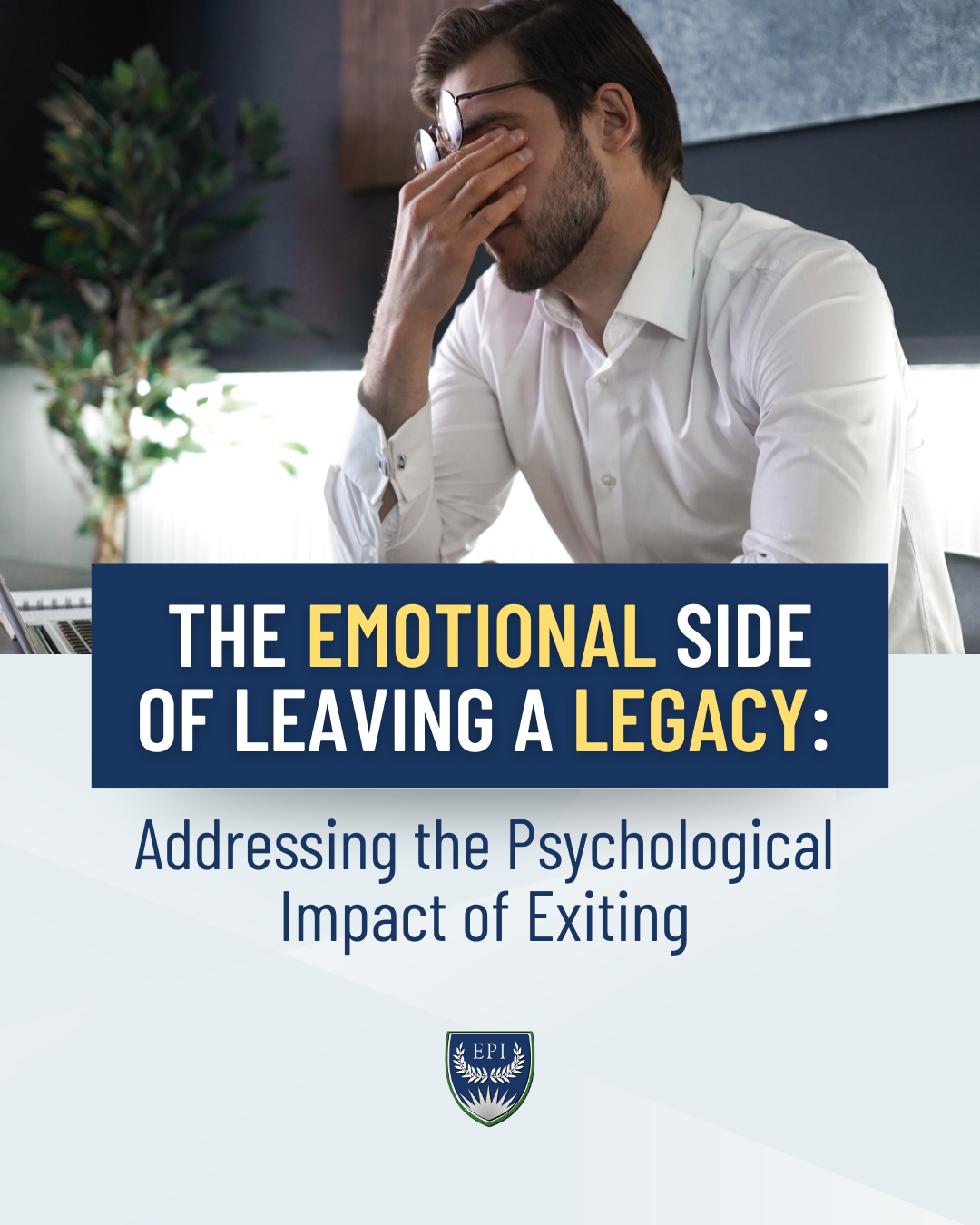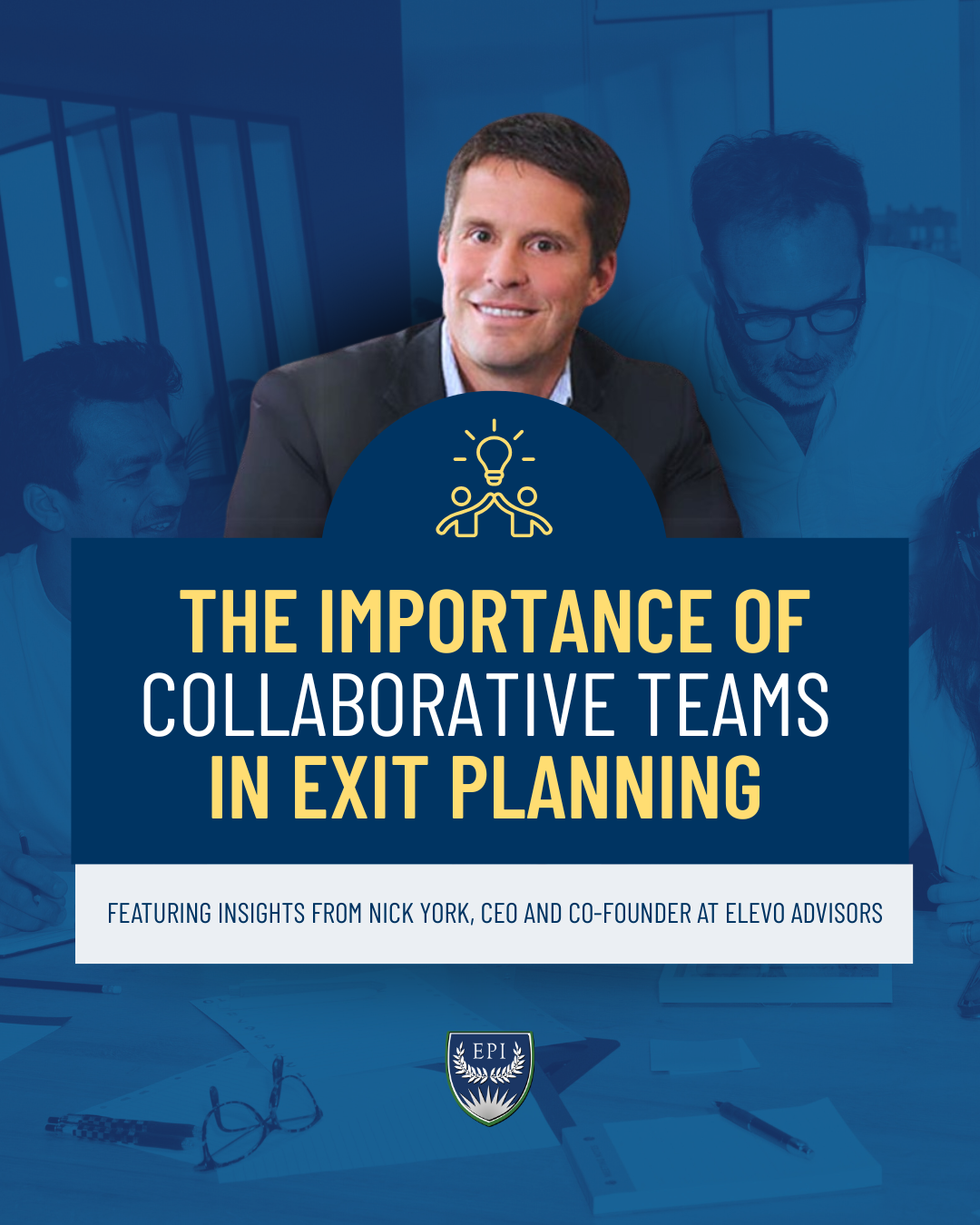
THE EXIT PLANNING BLOG
Keep up-to-date with exit planning, succession planning, industry trends, unique specialty insights, and useful content for professional advisors and business owners.
Share this
The Emotional Side of Leaving a Legacy: Addressing the Psychological Impact of Exiting
by Kellie Nock on May 22, 2025

Don't Underestimate the Emotions
In business, we are often taught to separate our emotions from the process, whether that involves purchasing, running, or exiting the company. It is easy enough to say, “don’t bring your work home,” but business owners are not typically able to leave it at the door. In fact, some business owners might even argue that their business is their “baby.” As humans, it is impossible to separate ourselves from our work, and this is especially true for business owners who invest money, time, and grit into their business. When it comes time to reap the rewards, it can take a heavy emotional toll on the owner, who may just now be realizing that they are about to leave their baby.
Anger, excitement, fear, and relief are all emotions that may be swirling around as the exit approaches. It can create a whirlwind of emotional highs and lows, leaving a lasting impact on the owner’s mental health and overall well-being. How can we address this whirlwind while dealing with the logistical stress of exiting the business?
How to Leave a Legacy
When we think of legacy, we think of what we leave behind. For business owners, legacy can mean your community impact, your familial impact, your business impact, or all of the above. It is intrinsically tied to your identity as a business owner, and when you’re confronted with the reality of cementing your legacy, it can feel overwhelming. You have spent years building, bolstering the business’s intangible capitals, and aligning the Three Legs of the Stool™. Now, it’s time to leave it behind.
If it seems daunting, that’s because it is. If the owner has walked through the Value Acceleration Methodology™ with a Certified Exit Planning Advisor (CEPA®), they understand the impact that their legacy could have on both their business and factors like their family and industry.
The Psychological Impact of Exiting a Business
Compartmentalization, or the separation of things into different categories, can seem simple enough. Business is business, and personal is personal. In reality, business is personal. The owner’s every day extends beyond the standard nine to five. They eat, sleep, and breathe the business. It cannot be a surprise, then, that when it comes time to exit, those intense, up-and-down feelings can have a real psychological impact on the owner.
This is where emotional readiness is vital and why the decentralization of the business owner (a key initiative in the Value Acceleration Methodology) is important. As difficult as it can be to leave the baby during the Value Acceleration Methodology process, the owner can pair up with the CEPA, who will help them explore the best options as they prepare for the exit. For example, if an owner is planning a succession exit, there might be an opportunity to stay close to the business in a more consultant-style role rather than totally separating from the business. If the business is being sold or the owner is retiring, the CEPA can help them adjust and set goals for life post-exit, including guidance for new business ventures or advice on life plans for post-retirement.
How to Help
In the daily grind, owners often lack the time or space to reflect on their own emotional well-being. As the world seems to move faster and faster, it can feel challenging or unimportant to take a moment, take a deep breath, and assess how it truly feels to approach the point of exit. Journaling allows words to be put on paper, creating a tangible way to understand and monitor emotions.
If journaling does not feel right, leaning on a support system is always helpful. Family and friends can be a great sounding board for owners to express how they feel about their exit. Fellow business owner peers can provide deep empathy as they have navigated or will navigate a similar exit situation at some point in their professional lives. One source of strength is also the CEPA, the “quarterback” for the business owner through this process. As part of their exit journey, the CEPA is not only familiar with the exit process but also with who the business owner is. That personal touch is key.
Ultimately, the exit journey is emotionally taxing. There is no way around that. However, with the assistance of the CEPA, the owner’s support system, and intentional self-reflection, it doesn’t have to feel so burdensome.
Want to learn more about emotional mindfulness? Check out our article on business owner mental health in our first-of-its-kind exit planning magazine, Annual Exit.
Download Annual Exit
Related Resources:
Share this
- Blog (548)
- CEPA (431)
- exit planning (249)
- CEPA community (188)
- Business Owner (175)
- Exit Planning Summit (99)
- EPI Chapter Network (89)
- Value Acceleration Methodology (81)
- Exit Planning Partner Network (76)
- EPI Announcement (50)
- Content (48)
- Webinars (37)
- Excellence in Exit Planning Awards (34)
- Marketing (30)
- 2024 Exit Planning Summit (28)
- 5 Stages of Value Maturity (26)
- Books (24)
- EPI Academy (24)
- EPI Team (22)
- Exit Planning Teams (22)
- Leadership (21)
- 2023 Exit Planning Summit (20)
- family business (20)
- women in business (19)
- Intangible Capital (18)
- Exit Options (17)
- Black Friday (16)
- CPA (15)
- Walking to Destiny (15)
- Chapters (14)
- State of Owner Readiness (14)
- charitable intent (13)
- Chris Snider (12)
- National Accounts (12)
- Small business (12)
- personal planning (12)
- Financial Advisors (11)
- Season of Deals (9)
- 5 Ds (8)
- About us (8)
- Podcast (8)
- Scott Snider (8)
- Insiders Bash (7)
- Christmas (6)
- Exit Planning Content Library (6)
- Case Studies (5)
- Owner Roundtables (5)
- Three Legs of the Stool (5)
- Value Advisors (5)
- financial planning (5)
- Awards (4)
- Circle of Excellence (4)
- EPI Thought Leadership Council (4)
- Exit & Succession (4)
- Five Ds (4)
- executive training (4)
- DriveValue (3)
- Owners Forum (3)
- author (3)
- forbes (3)
- Exit Is Now Podcast (2)
- Peter Christman (2)
- Veteran (2)
- Whitepapers (2)
- Annual Exit (1)
- Business Owners Forum (1)
- SOOR (1)
- business consultants (1)






